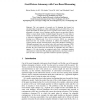Free Online Productivity Tools
i2Speak
i2Symbol
i2OCR
iTex2Img
iWeb2Print
iWeb2Shot
i2Type
iPdf2Split
iPdf2Merge
i2Bopomofo
i2Arabic
i2Style
i2Image
i2PDF
iLatex2Rtf
Sci2ools
117
click to vote
ICCBR
2010
Springer
2010
Springer
Goal-Driven Autonomy with Case-Based Reasoning
The vast majority of research on AI planning has focused on automated plan recognition, in which a planning agent is provided with a set of inputs that include an initial goal (or set of goals). In this context, the goal is presumed to be static; it never changes, and the agent is not provided with the ability to reason about whether it should change this goal. For some tasks in complex environments, this constraint is problematic; the agent will not be able to respond to opportunities or plan execution failures that would benefit from focusing on a different goal. Goal driven autonomy (GDA) is a reasoning framework that was recently introduced to address this limitation; GDA systems perform anytime reasoning about what goal(s) should be satisfied [4]. Although promising, there are natural roles that case-based reasoning (CBR) can serve in this framework, but no such demonstration exists. In this paper, we describe the GDA framework and describe an algorithm that uses CBR to support it...
| Added | 15 Aug 2010 |
| Updated | 15 Aug 2010 |
| Type | Conference |
| Year | 2010 |
| Where | ICCBR |
| Authors | Héctor Muñoz-Avila, Ulit Jaidee, David W. Aha, Elizabeth Carter |
Comments (0)

